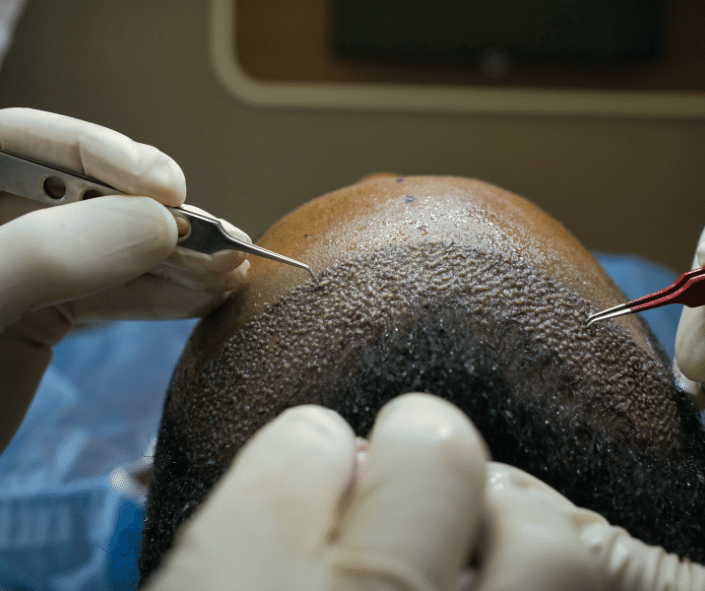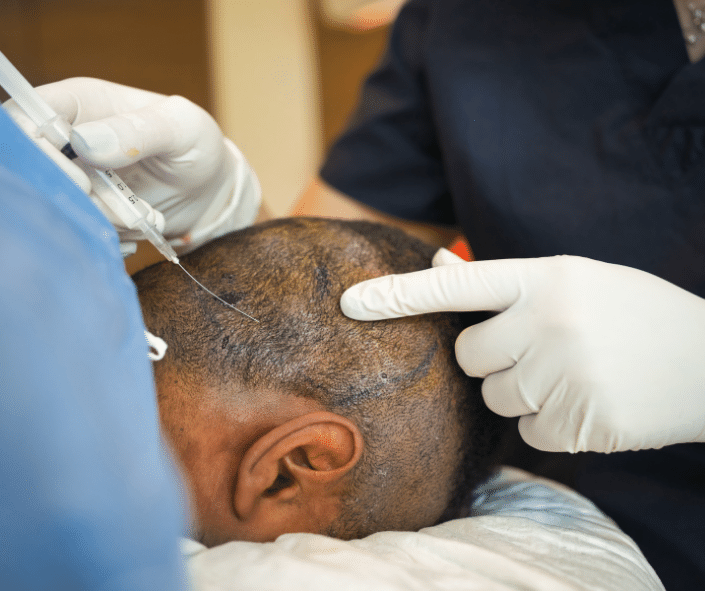Hair Transplant
Timescale: 2 Days
GET A FREE QUOTE
“Thanks to the hair transplantation treatment, my hair has become thick and healthy again. I feel younger and more energetic.”
We guarantee, we make sure your hair grows back the right way.
We care for our patients’ aftercare as well. We don’t want you to experience any unpleasant issues at anytime. This is why we use the products of the best and the most trusted brands only.
What is DHI Hair Transplant Treatment?
DHI (Direct Hair Implantation) is a modern hair transplant technique that is a variation of the Follicular Unit Extraction (FUE) method. DHI is known for its precise and controlled process of hair follicle implantation during the transplant procedure.
In DHI hair transplant, the steps involved are as follows:
-
Extraction of Hair Follicles: Similar to FUE, individual hair follicles are extracted from the donor area using a specialized punch tool. The donor area is typically the back or sides of the scalp, where hair follicles are more resistant to balding.
-
Sorting and Preservation of Hair Follicles: Once the hair follicles are extracted, they are carefully sorted and preserved in a special solution to maintain their vitality and viability until they are ready for implantation.
-
Creation of Channels: In DHI, unlike traditional FUE, the process of creating channels or recipient sites for implantation is integrated into the same step as the hair follicle extraction. This is achieved using a specialized tool called a Choi pen, which has a hollow needle with a diameter equal to the size of the hair follicles. The Choi pen allows for precise control and angle of implantation, resulting in a natural-looking hairline and density.
-
Implantation of Hair Follicles: The extracted hair follicles are individually implanted directly into the recipient area using the Choi pen. This process is performed by an experienced surgeon or trained technician who carefully inserts the hair follicles into the pre-made channels.
The key advantage of DHI hair transplant is the ability to control the angle, depth, and direction of hair follicle implantation during the procedure, which can contribute to a more natural and aesthetically pleasing result. Additionally, the integrated channel creation and implantation process can reduce the time the hair follicles spend outside the body, potentially improving their survival rate.
However, it’s important to note that DHI hair transplant may not be suitable for everyone. The eligibility for the procedure depends on various factors, including the extent of hair loss, available donor hair, scalp condition, and individual needs. It’s recommended to consult with a qualified hair transplant specialist who can evaluate your specific situation and provide personalized advice on the most appropriate hair restoration options for you.

Who can have DHI Hair Transplant treatment done?
DHI (Direct Hair Implantation) hair transplant treatment can be suitable for individuals who are experiencing hair loss or thinning and wish to restore hair density in specific areas of the scalp. However, the eligibility for DHI hair transplant depends on various factors, including the extent of hair loss, available donor hair, scalp condition, and individual needs. Here are some considerations:
-
Hair Loss Stage: DHI hair transplant is typically recommended for individuals who have stable hair loss or minimal progression of hair loss. It may not be suitable for individuals with active or rapidly progressing hair loss. Consulting with a hair transplant specialist can help determine the appropriate timing for the procedure.
-
Donor Hair Availability: Adequate donor hair is crucial for a successful DHI hair transplant. The donor area, typically the back or sides of the scalp, should have sufficient healthy hair follicles that can be harvested and transplanted to the recipient area. The density and quality of the donor hair will be evaluated during the consultation process.
-
Scalp Condition: The condition of the scalp plays a role in determining the suitability for DHI hair transplant. The scalp should be healthy, free from any active scalp conditions or infections that may interfere with the success of the procedure. A thorough scalp examination will be conducted to assess the scalp health.
-
Expectations and Goals: It is important to have realistic expectations and clear goals for the outcome of the DHI hair transplant. The hair transplant specialist will evaluate your expectations and discuss the potential results based on your individual circumstances. Understanding the limitations and potential outcomes will help you make an informed decision.
-
General Health: Overall general health is also a factor to consider. Individuals with certain medical conditions or those taking medications that may affect hair growth or healing may need to be evaluated on a case-by-case basis.
To determine if DHI hair transplant is suitable for you, it is recommended to consult with a qualified hair transplant specialist. They will evaluate your specific situation, assess your hair loss pattern, examine the donor area, and discuss your expectations. Based on this evaluation, they can provide personalized advice on whether DHI hair transplant is an appropriate treatment option for you or if any alternative procedures would be more suitable.

What is the DHI Hair Transplant post-surgery process like?
The post-surgery process for DHI (Direct Hair Implantation) hair transplant can vary depending on individual factors and the extent of the procedure. Here are some general considerations:
-
Immediate Post-Surgery Care: After the DHI hair transplant procedure, the transplanted area may be covered with a protective bandage or dressing. Your surgeon will provide specific instructions on how to care for the treated area during the initial healing period. This may include avoiding excessive touching, scratching, or rubbing of the transplanted area.
-
Medications and Follow-Up Appointments: Your surgeon may prescribe medications, such as antibiotics to prevent infection or pain medications to manage any discomfort or pain. It’s important to follow the prescribed medication regimen as directed. Additionally, your surgeon will schedule follow-up appointments to monitor the progress of your healing and provide any necessary guidance or adjustments.
-
Scalp Care: Proper scalp care is crucial for the healing process and the success of the DHI hair transplant. Your surgeon will provide instructions on how to care for the scalp during the recovery period. This may include gentle cleansing of the scalp with a mild shampoo and avoiding any harsh or irritating hair products. It’s important to follow the scalp care instructions provided by your surgeon to promote healing and minimize the risk of complications.
-
Shedding and Hair Growth: It’s normal to experience shedding of the transplanted hair within a few weeks after the DHI hair transplant. This is known as “shock loss” and is a temporary phase. After the shedding phase, new hair growth should begin within a few months. The initial hair growth may appear thin and sparse, but it will gradually improve over time as the transplanted follicles establish themselves and go through the natural hair growth cycle.
-
Resuming Regular Activities: The timeline for resuming regular activities, including work, exercise, and other daily routines, will depend on individual healing and the specific instructions provided by your surgeon. It’s important to avoid strenuous activities, excessive sweating, and direct sun exposure on the scalp during the initial healing period to promote optimal recovery.
-
Long-Term Care: Once the initial healing is complete, it’s important to maintain a healthy scalp and follow a proper hair care routine. Your surgeon may provide recommendations on ongoing scalp care, including shampooing, conditioning, and styling your hair. Regular follow-up appointments with your surgeon will also be scheduled to monitor the progress of your hair growth and address any concerns.
It’s important to note that the post-surgery process can vary from person to person, and individual recovery times may differ. Following the specific post-surgery instructions provided by your surgeon is crucial for a successful outcome. If you have any questions or concerns during the recovery process, it’s important to contact your surgeon for guidance and support.

